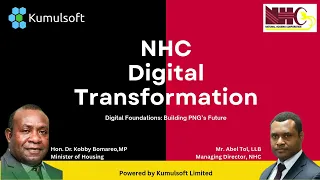Driving PNG’s Private Sector with Digital Transformation for Economic Resilience and Inclusive Growth!

In the current swiftly changing global economy, digital transformation has emerged as an indispensable requirement rather than a choice, especially for Papua New Guinea’s private sector. Due to its challenging terrain, infrastructural limitations, and scattered communities, PNG faces unique obstacles, and equally unique opportunities.
Therefore, adopting digital tools and strategies goes beyond simply implementing new technology; it’s about fundamentally transforming how businesses operate, compete, and contribute to national development.
The Critical Importance of Digital Transformation for PNG’s Private Sector
For PNG’s private sector, digital transformation is more than a strategic option, it is an urgent necessity, driven by several compelling reasons:
Overcoming Infrastructure Challenges: PNG’s rugged terrain and infrastructural limitations hinder traditional business operations. Digital tools such as mobile and satellite technology enable businesses to operate efficiently despite these barriers, ensuring connectivity and access to markets.
Unlocking Economic Potential: Digital transformation opens avenues for economic diversification, allowing PNG to develop sectors like agriculture, tourism, and finance through innovative digital solutions, thereby reducing reliance on traditional resource exports.
Enhancing Market Access: Many businesses in remote areas struggle to reach customers locally and internationally. Digital platforms and e-commerce allow these businesses to broaden their reach, explore new markets and increase their revenue potential.
Fostering Innovation and Competitiveness: Adoption of digital technologies such as cloud computing, IoT, and mobile applications fosters innovation, allowing PNG’s private sector to stay competitive in a rapidly globalizing economy.
Building Resilience Against Disruptions: Natural disasters and global shocks can severely impact traditional business models. Digital solutions, like off-grid energy, digital IDs, and cloud backup allows businesses to respond quickly and maintain continuity during emergencies.
Promoting Financial Inclusion: Digital ID systems and mobile banking extend financial services to rural and underserved communities, empowering entrepreneurs and increasing economic participation across the country.
Creating Jobs and Skills Development: The digital economy drives demand for new roles in ICT, digital marketing, and data analytics, contributing to employment growth and capacity building for PNG’s workforce.
Attracting Foreign Investment: Modernized, digitally-enabled businesses are more attractive to international investors, fostering economic growth and development.
These reasons highlight that digital transformation is not only beneficial but essential for PNG’s private sector to thrive in a challenging environment and to unlock its full economic potential.
PNG’s Digital Leap: From Indicators to Impact
Recent initiatives highlight PNG’s commitment to digital progress:
- The Digital Government Plan aims to connect 70% of the population by 2030, a bold step toward inclusive development. Internet penetration has risen to over 50%, signaling increased digital engagement.
- Innovative initiatives such as off-grid solar-powered data centers and satellite internet services like the proposed Starlink will help to close the connectivity gap, particularly in remote and rural regions.
- The establishment of digital ID systems like YuTru is opening doors for financial inclusion, secure identity verification, and streamlined services.
These developments are transforming how businesses operate, streamlining processes, enabling e-commerce, and fostering innovation across sectors like agriculture, tourism, and finance, proving that digital transformation is vital for the country’s economic resilience and growth.
Emerging Trends: Why PNG Must Accelerate Digital Adoption
1. Digital Identity and Financial Inclusion:
Digital IDs are helping banks and fintech firms extend services to the unbanked, reducing reliance on cash and expanding access to credit and mobile banking, essential for rural communities where conventional banking infrastructure is sparse.
2. E-Commerce and Market Access:
Startups and SMEs are leveraging social media and online platforms to reach local and international markets, demonstrated through success stories in the fields of retail,
3. Cloud and Data Solutions:
Organizations integrating cloud technology enhance data management, lower expenses, and become more agile, vital for competing regionally and globally.
4. Mobile Tech Innovation:
Mobile apps for health, education, and agriculture are transforming service delivery, bridging infrastructure gaps, and improving social outcomes.
Countries like India have demonstrated that digital transformation drives economic diversification and job creation. For PNG, this underscores that digital adoption isn’t optional, it’s essential for:
Efficiency improvements: Optimizing operations decreases expenses and enhances service delivery.
Market expansion: Digital tools open new avenues for exports and investments.
Competitiveness: Updated businesses draw foreign investment and respond quickly to changes.
Inclusivity: Digital IDs and mobile banking empower marginalized communities, women, and youth, fostering social and economic inclusion.
Key Drivers of PNG’s Digital Shift
Government policies and investments are laying the groundwork for a digital future. Private sector innovation is crucial, therefore, startups and established firms deploying AI, IoT, and cloud solutions are vital to staying competitive. Partnerships among government, development agencies, and private companies or industrial bodies such as ICT Cluster, are creating the ecosystem needed for scale and impact.
The Business Case: Why Digital Transformation Cannot Wait
For PNG’s private sector, the benefits are clear:
- Operational efficiency: Automation and digital workflows reduce errors and save time.
- Cost reduction: Moving from paper-based to digital systems cuts administrative and logistical expenses.
- Business resilience: Cloud systems and off-grid solutions ensure continuity during disruptions.
- Job creation and skills development: The digital economy generates new roles, especially in ICT, digital marketing, and customer service
The Road Ahead: Critical Trends for PNG’s Digital Future
- Rural digital inclusion: Satellite and mobile tech are vital for connecting remote communities.
- Fintech and microfinance: Digital payments and microloans will unlock entrepreneurship.
- Smart cities and infrastructure: Urban pilot projects demonstrate scalable models for sustainable development.
- Community-led innovation: Local, open-source solutions tailored to PNG’s unique needs will drive cost-effective and sustainable growth.
What PNG Businesses Must Do Now
- Leverage Digital IDs: Use systems like YuTru to enhance security and access financial services.
- Adopt cloud and mobile solutions: Streamline operations and reach customers anywhere.
- Invest in skills: Build capacity in digital literacy, cybersecurity, and data analytics.
- Partner strategically: Collaborate with government programs, NGOs, and tech providers to expand digital access.
- Embrace innovation: Test emerging technologies and modify strategies to maintain a competitive edge.
As PNG’s private sector faces increasing global competition and infrastructural hurdles, the importance of digital transformation cannot be overstated. For a comprehensive understanding of how digital transformation is advancing across all sectors, explore our blog on Digital Transformation in PNG’s public sector.
In Conclusion
Digital transformation in PNG’s private sector isn’t just about adopting new gadgets; it’s about reshaping business models, unlocking new opportunities, and building resilience against future shocks.
For PNG to thrive in an interconnected world, private sector leaders must recognize that embracing digital tools and fostering innovation are critical steps towards sustainable growth and inclusive prosperity. By taking this approach, PNG can unlock its full potential, becoming a resilient, competitive, and digitally empowered nation.





